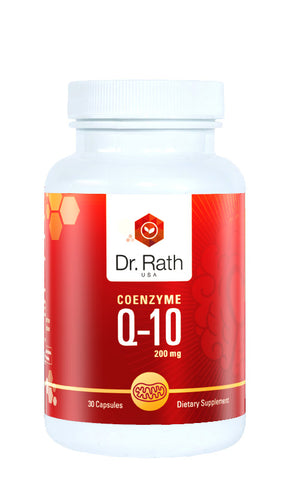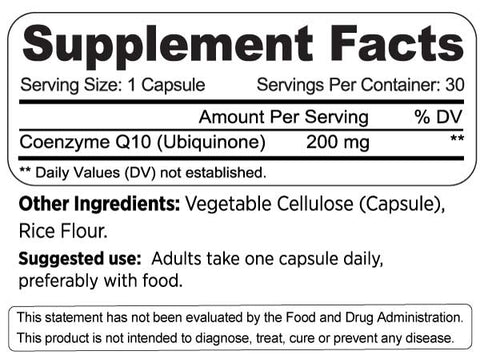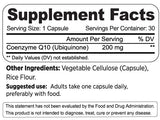recommendations, please contact our nutritionist at healthinfo@drrath.com
Description:

Coenzyme Q10 (CoQ10) is a fat-soluble molecule found naturally in the cell membrane of every cell in the body and is essential for healthy functioning of all tissues and organs. It is present in the body in two forms as ubiquinone and ubiquinol and regularly converts back and forth depending on the energy requirement. In the supplement form, ubiquinone supplements are more stable.
CoQ10 is the only fat-soluble antioxidant synthesized in the body; yet, its internal synthesis gradually starts to decrease once we reach the late twenties. Endogenous production of CoQ10 requires multiple vitamins, amino acids, and minerals as cofactors, and a deficiency of any of these can decrease CoQ10 production. Therefore, it is necessary to supplement CoQ10 from the outside. Since it is a fat-soluble compound, CoQ10 is better absorbed when taken with healthy fats such as omega-3 fatty acids either in the diet or in the supplement forms.
Key health benefits of CoQ10
Cardiovascular System: CoQ10 is the key compound for the conversion of energy stored in food into ATP. It is an important cofactor in the mitochondria to generate bioenergy molecules (ATP) through aerobic respiration in every cell of the body. This bioenergy is especially critical for the constant pumping of the heart and the endothelial cells lining the blood vessels all over the body. CoQ10 can increase the blood flow and helps in maintaining undisturbed blood flow to the heart. It can also protect blood vessels by the conservation of nitric oxide, which in turn helps in maintaining healthy blood pressure levels as well as improving peripheral circulation, which is affected in various cardiovascular diseases. CoQ10 is helpful in maintaining healthy cholesterol and blood sugar levels and protects the cardiovascular system from the side effects of several medications which affect its internal synthesis.
Immune system: Being an essential element in bioenergy production, CoQ10 has an important role in fighting infections when the body is under stress and with high energy demands. CoQ10 increases the levels and activity of T Lymphocytes, immunoglobulin-G (IgG) and NK (Natural Killer) cells, all of which are critical in fighting viruses and other infectious agents. In addition to being an integral part of the mitochondrial energy production, CoQ10 also initiates other immune response pathways and anti-viral signaling within the mitochondria to assist in destruction of invading pathogens.
Brain and nervous system: The brain and nervous system needs a constant supply of energy and is more susceptible to the damage caused by free radicals. Normal brain function utilizes approximately 20% of the total energy required by the body. Mitochondrial dysfunction is one of the main characteristics of the brain aging, which starts after the age of forty. CoQ10 not only supplies the bioenergy required for functioning of the brain, it has also shown to increase concentration of mitochondria in the brain and exert neuroprotective effects. CoQ10 has also shown to improve production of serotonin, the neurotransmitter in the brain. Serotonin is important for learning, memory, cognition, and happiness, many of which are affected in several psychiatric and neurodegenerative conditions including Parkinson’s disease, Alzheimer’s disease, and depression. CoQ10 also helps in nerve repair in neuropathies.
Antioxidant and anti-inflammatory: Free radicals and chronic inflammation contribute to the development of many chronic and autoimmune conditions. As an antioxidant, CoQ10 protects cellular structures, including DNA, from damage caused by free radicals. Additionally, it enhances the levels of other antioxidants in the body. It can help recycle oxidized forms of vitamins C and E back to their active, reduced forms, as well as increase the production of superoxide dismutase, a key antioxidant enzyme that has been found to be depleted in various ailments.
The anti-inflammatory properties of CoQ10 can help reduce inflammatory markers such as C-reactive protein, interleukins 1 and 8, and tumor necrosis factor-alpha, which are elevated in chronic inflammatory conditions.
Healthy tissues: The anti-aging benefits of CoQ10 are related to its role in energy (ATP) generation in the mitochondria, and production of the skin proteins collagen and elastin. Human skin undergoes constant repair and a deficiency of CoQ10 creates an energy deficit leading to non-repair and visible aging effects on the skin. CoQ10 supplements may improve skin elasticity and smoothness. CoQ10 stimulates the production of the hair protein keratin and promotes hair growth.
Physical performance: Due to its critical role in energy production, CoQ10 may help in improving athletic performance. It is shown to improve symptoms of muscle ache and fatigue after physical exertion.

Customer Reviews
Other fine products
Specials









